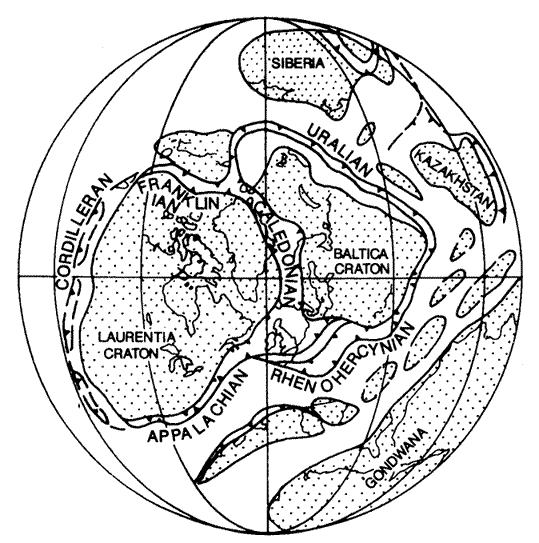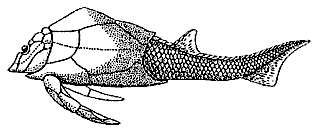Euramerica
aka Laurussia aka "Old Red Continent"

The Devonian continent of Euramerica formed by the collision of
Baltica and Laurentia. The
Caledonian orogeny marks the suture between the
two. (illustration from D.L. Dineley and E.J. Loeffler, 1993, "Biostratigraphy of the Silurian and Devonian Gnathostomes of the Euramerica Province,"
in John A. Long, ed., Palaeozoic Vertebrate Biostratigraphy and Biogeography,
John Hopkins University Press, Baltimore, p.106, after Ziegler, P.A. 1988, Laurussia - The Old Red Continent. In N.J.McMillan, A.F.Embry, and
D.J. Glass (eds.) Devonian of the World, Canadian Society of Petroleum Geologists, Memoir 14, I: 15-48.
Euramerica, also known as Laurussia, was an ancient, mostly Late Silurian and Devonian, continent incorporating
what is now North America, Greenland, and Europe. It is also known
as the "Old Red Continent" because of the distinct oxidized deposits left in Laurussia. This great supercontinent had its own unique fauna, including
many species of armoured fish not found elsewhere.

Pterichthyodes - an Antiarch
placoderm
(armoured fish) endemic to Euramerica
Givetian
age - length 15 cm
Name: Euramerica
Status: Major Continent (Paleozoic)
Duration: Silurian to
Carboniferous
Included the present-day North America, Greenland, and Europe
Formed by: suturing of
Laurentia and
Baltica
Collided with: Gondwana to form
Pangea
Indigenous biota: Unique fauna of armoured fish (Agnatha and Placoderms) in marginal marine environments. Distinctive
land plants
References (Vertebrate Biogeography)
 P. Janvier and A. Blieck, 1993, "The Silurian-Devonian Agnathan Biostratigraphy of the Old Red Continent,"
in John A. Long, ed., Palaeozoic Vertebrate Biostratigraphy and Biogeography, John Hopkins University Press, Baltimore, pp.70-73
P. Janvier and A. Blieck, 1993, "The Silurian-Devonian Agnathan Biostratigraphy of the Old Red Continent,"
in John A. Long, ed., Palaeozoic Vertebrate Biostratigraphy and Biogeography, John Hopkins University Press, Baltimore, pp.70-73
 D.L. Dineley and E.J. Loeffler, 1993, "Biostratigraphy of the Silurian and Devonian Gnathostomes of the Euramerica Province," in John A. Long, ed., Palaeozoic Vertebrate Biostratigraphy and Biogeography, John Hopkins University Press, Baltimore, p.106, after Ziegler, 1988).
D.L. Dineley and E.J. Loeffler, 1993, "Biostratigraphy of the Silurian and Devonian Gnathostomes of the Euramerica Province," in John A. Long, ed., Palaeozoic Vertebrate Biostratigraphy and Biogeography, John Hopkins University Press, Baltimore, p.106, after Ziegler, 1988).
images not loading? | error messages? | broken links? | suggestions? | criticism?
page uploaded to Kheper site 4 August 1998, to
Palaeos
site 5 April 2002
checked ATW030801, edited RFVS111108
unless otherwise specified, content by
M. Alan Kazlev 1998-2002
bars and buttons from
Jelane's families of graphics
Unless otherwise attributed, text on this page is licensed under a
Creative Commons License.
Apart from menu header, images on this page are not covered by this
license,
and are copyright their respective owner or publisher.




![]() P. Janvier and A. Blieck, 1993, "The Silurian-Devonian Agnathan Biostratigraphy of the Old Red Continent,"
in John A. Long, ed., Palaeozoic Vertebrate Biostratigraphy and Biogeography, John Hopkins University Press, Baltimore, pp.70-73
P. Janvier and A. Blieck, 1993, "The Silurian-Devonian Agnathan Biostratigraphy of the Old Red Continent,"
in John A. Long, ed., Palaeozoic Vertebrate Biostratigraphy and Biogeography, John Hopkins University Press, Baltimore, pp.70-73![]() D.L. Dineley and E.J. Loeffler, 1993, "Biostratigraphy of the Silurian and Devonian Gnathostomes of the Euramerica Province," in John A. Long, ed., Palaeozoic Vertebrate Biostratigraphy and Biogeography, John Hopkins University Press, Baltimore, p.106, after Ziegler, 1988).
D.L. Dineley and E.J. Loeffler, 1993, "Biostratigraphy of the Silurian and Devonian Gnathostomes of the Euramerica Province," in John A. Long, ed., Palaeozoic Vertebrate Biostratigraphy and Biogeography, John Hopkins University Press, Baltimore, p.106, after Ziegler, 1988).